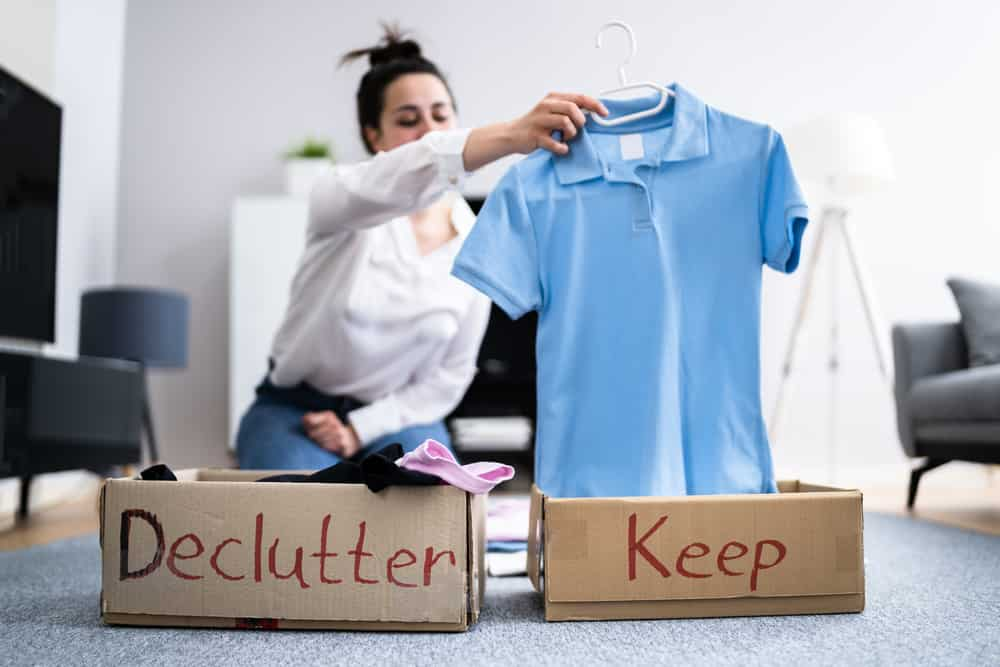Tidying up can have more health benefits than you realise. Here’s why decluttering your space should be on your to-do list.
When people talk about ‘self-care,’ they usually think of pampering at a spa, eating healthier, or going to the gym.
But the secret to improving both your physical and mental health may be closer to home than you think. In fact, it may be within your walls.
Peter Walsh, renowned organisational expert and author, firmly believes that clutter is anything that stands in the way of people living their best lives.
“Clutter is not just the stuff on your floor – it’s anything that stands between you and the life you want to be living,” he wrote in his book, “It’s All Too Much: An Easy Plan for Living a Richer Life with Less Stuff.”
If you’re constantly shuffling things around to get things done at home or work, or if you feel swamped by all your stuff, it’s a sign that clutter has taken over.
Joseph Ferrari, a professor of psychology at DePaul University in Chicago, defines clutter as “an overabundance of possessions that collectively create chaotic and disorderly living spaces.”
And a cluttered home, as recent research suggests, can be a stressful one. Clutter and mess is linked to negative emotions like confusion, tension, and irritability while an organised home tends to be associated with more positive emotions like calmness and a sense of well-being.
A study published in the journal Personality and Social Psychology Bulletin showed that women who described their homes as ‘cluttered’ were more likely to be depressed than those who identified their homes to be ‘restful and restorative’.
Similarly, a study published in Journal of Environmental Psychology revealed clutter had a negative impact on people’s psychological well-being.
On the bright side, there’s also science showing keeping things clean and organised has many physical and mental health benefits. It’s no wonder then how the Marie Kondo tidying method and minimalism gained traction in recent years.
After all, decluttering or the process of putting away miscellaneous items where they belong or getting rid of unused items) not only makes it easier to find what you need, but it can also improve your physical health and mental wellbeing.
Let’s take a closer look at how tidying up your space can be beneficial to both your mental and physical health.
7 health benefits of decluttering
The process of decluttering your space may be a chore, but here are some of the benefits of letting go of your unnecessary items:
1. Improve your focus
Ever went shopping in a cluttered space like a big second-hand store or farmers market, only to leave in frustration because you couldn’t find what you were looking for?
The reason you feel like you’re looking for a needle in a proverbial haystack is the same reason why disorderly environments make it tough to focus on your task: distraction.
A study by Princeton University researchers titled Interactions of top-down and bottom-up mechanisms in human visual cortex discovered that clutter can make it difficult to focus on a task.
To be more specific, it was revealed that a person’s visual cortex can be overwhelmed by objects not related to a particular task, making it harder to focus and complete projects in an efficient and timely manner.
Sharpen your focus by taking time to declutter your working space or your home. This is especially important if you’re working remotely at home. Less mess, more focus.
2. Reduce your stress
One of the biggest benefits of decluttering is the reduction in stress and anxiety.
When there’s lots of clutter, you lose control over your physical space, which is very upsetting and can cause increased stress levels.
In fact, research shows that women with less organised living spaces also had higher levels of the stress hormone cortisol, which is responsible for feelings of anxiety, tension and often associated with mental health conditions such as depression.
And when you’re stressed, it’s easy to procrastinate when it comes to tasks that seem too big to take — like tackling your overflowing junk drawer or sorting through unwanted items you’ve been putting off donating in months.
If you’re looking for ways to lower your stress levels, consider decluttering as a first step.
A study by the University of Connecticut found that in times of high stress, people default to repetitive behaviors like cleaning because it gives them a sense of control during a chaotic time in your life.
By clearing up your physical environment of clutter, you also clear up some mental space in the process – helping you gain a sense of control. Decluttering can give you peace of mind and help clear your thoughts.
3. Better quality of sleep
Keeping your home — especially your bedroom— clean, tidy and free from clutter can help create a calm and peaceful environment in which to sleep in.
A messy space can cause several problems, like worse air quality, stress, and anxiety. These issues can make it hard to fall asleep and disturb your sleep.
When you declutter your bedroom, you create an organised environment providing visual calm, allowing you to unwind after a long day and transition more easily into sleep mode.
And research aside, doesn’t it make sense to organise or remove unneeded items in a place where you replenish your physical and mental energy?
4. Improved air quality in your home or work space
If you have respiratory issues like asthma, you make be all too familiar with the troubles that come with clutter.
Unnecessary items piled up or scattered in your space can gather up pollen, dust, pet dander and mold particles, worsening your indoor air quality and putting your health at risk.
The more clutter you have, chances are the more surface area these particles have to cling to.
Clearing out the clutter can help make it easier to clean and reduce dust accumulation. And once the dust begins to clear, you should be able to start breathing easier. A tidy space also has improved air circulation!
5. Help you lose weight
This seems like a surprising benefit of decluttering, but having a clean and organised space can significantly improve your eating habits for the better.
Multiple studies have found a link between clutter and poor eating choices. A study found that participants who spent time in a messy kitchen ate more provided cookies than those in a cleaner and orderly kitchen.
However, the study also showed that recalling a time the participants felt in control caused them to eat fewer cookies in the disorganised space, suggesting that mindset can reduce or mediate cravings in a chaotic environment.
Aside from triggering poor food choices, science shows that living or working in a cluttered space can lead to weight gain as well. A study on the link between hoarding and weight gain found people living in extremely cluttered and messy environments were 77 per cent more likely to be overweight.
Of course, not everyone has a severe hoarding problem. But clutter-linked weight gain may also indicate that people are leading overly busy lives.
People who are in a rush are more likely to eat what’s handy, such as pre-packaged or fast foods, which in turn leads to obesity. After all, why bother cleaning up a messy kitchen and preparing food when you can just order on Ubereats or Doordash?
In a more organised home, you have more time to plan and make healthier meals — as well as more time to relax and eat more slowly.
6. Getting more active
Decluttering isn’t just about tidying up your space; it can also give you a much needed boost in physical activity.
In fact, studies suggest that the process of decluttering can torch around 240 calories per day for the average homeowner. So, not only does decluttering make your home look better, but it’s also a simple way to sneak in some extra activity into your day-to-day routine.
The cherry on top is the sense of accomplishment you get after organising an area in your space. A boost in your mood from the small win of cleaning up your desk or getting rid of unneeded items may be just what you need to take on your next big goal!
7. Good for your heart
Decluttering can help boost your mood and reduce your stress, but did you know it can also help improve your heart health?
Donating items to charity organisations as a result of decluttering has been shown in several studies to have positive effects on both mental and physical health. It can reduce stress, lower blood pressure, and contribute to an overall sense of well-being.
When you get rid of the clutter you don’t use, need or love, you also often feel more appreciation and gratitude for the things that are left.
And science shows that being thankful, even for the little things, helps to lower stress levels, enhance blood pressure, and even reduce inflammation.
There’s also studies that show people who practice gratitude also exercise more and make healthier choices in their diet.
10 quick tips for decluttering your home or workspace
Do you have a clutter problem and don’t know where to start? Here are Spacer’s our quick tips to help you reclaim your space:
1. Start Small
Set small, achievable goals. For example with your work desk or a pile of clothes you’ve been meaning to get rid of to avoid feeling overwhelmed.
2. Set aside time for decluttering
Set a timer and allocate a specific amount of time for decluttering.
3.Use the four-box method
If you’re trying to get rid of a large variety of items, try using the four box method. Start by label boxes as Keep, Donate, Trash, and Relocate to make sorting items easier.
4. Try the ‘One in, One Out Rule’
This is a fairly simple method to avoid clutter buildup. For every new item brought in, remove one item that is unneeded or unusable. It’ll also help you become more conscious about your purchases, saving money in the long run.
5. Have a plan for your unwanted items
Donating your unused items can be a win-win scenario: you get objects out of your house while also putting them into the hands of those who need them. Try contacting charitable institutions or donation centres to schedule a drop-off or pick-up.
6. Get rid of duplicates
While it’s easy to get into the hype train of certain items like tumblers and items, sometimes less is more. Keep only one of each item and donate or discard duplicates to free up space.
7. Declutter regularly
Make decluttering a habit by scheduling regular sessions to prevent build-up of unnecessary items.
8. Ask for help
Of course, letting go of items is sometimes harder than it sounds. This is especially true if these items hold sentimental value. If you’re finding it difficult to clearly decide on the items you need to get rid of, enlist the help of a family member, friend, or paid consultant who can help you make decisions. In some cases, getting “permission” from someone else makes it easier to put your items in the donation or discard pile.
9. Declutter with a storage space
The decluttering process can be complicated if there are items you think you will need in the future, but you don’t have the space for it yet. Or maybe you just need something out of sight for them to be out of mind for a while, like extra furniture before a big move or children’s toys or clothes you’re planning to pass down to the younger generation In these cases, you can consider renting a storage space to make sure these items are protected and secured.
10. Celebrate your progress
We’ve all been there: we’ve started decluttering our home and mid-way, we lose all our motivation. It’s important to acknowledge and celebrate small victories to stay motivated throughout the decluttering process. But if clutter is overwhelming you or you are experiencing anxiety or depression, either causing clutter or due to out-of-control clutter, don’t be afraid to reach out to a therapist for help.
Find the storage you need with Spacer
Need a hand in decluttering your space? Spacer can help you find the storage space you need.
Whether you’re downsizing, renovating, or simply need extra room for your belongings, Spacer connects you with affordable storage solutions. Browse through a variety of storage options from spare rooms to parking spots across major cities including Sydney, Melbourne, Brisbane, Perth and more. Not living in the big smoke? Don’t worry! We also have local storage spaces that are cheap and convenient. Reclaim your living space today!
Related: 10 Home Office Storage Products to Declutter Your Office in Minutes




